Daedelus, the immaculately turned out Alfred Darlington, is an eloquent, kind and gentle man. As we sit down in Milk No Sugar, the newest (at time of going to press) trendy coffee shop on Brighton’s Trafalgar street, he insists I mention it on the website. He wants to return the favour, I guess. Of course, when I ask him what he thought of the coffee, he offers a three minute rant about the relative merits of different modes of coffee consumption, and how because he didn’t have an espresso, he couldn’t possibly comment. He’s that kind of person. A delight to interview (and a nightmare to edit), because the gentlest prod could send him to any corner of the universe.
So let’s get to it, and start prodding…
The new album’s really lush and dense. There’s a lot going on there, and I like it.
I appreciate that, thank you. I’ve done several records, and records show up in different ways in life. Some things are things we plan, some things are unplanned. This record was a little bit more on the unplanned side. Life decided to happen, and I was reacting to it in a recorded fashion, which is not necessarily the time frame that most people react to tragedy or trauma. Most of the time it’s something that takes a kicking to you, and you react defensively and try to cover up.
It’s fun to put out a record about some sort of pain, because you’re exposing the bruises a little bit. That can be awkward and unseemly, and I’m trying to guard against that, but at the same time I think no matter if you’re a public persona or not, we’re all living with each other in a way that there’s a certain amount of understanding. Everyone goes through loss in life, and I think the more we can be empathetic towards that, the better. So rather than this record trying to be just me shouting about it, it’s kind of trying to empathetically put something out there, if that makes sense. So the density you’re getting I think is reasonable.
I really liked the bit of morse code halfway through the album. There’s something so melancholy about morse code, because it’s just sending messages out into the void.
There was lots of stuff that was the root cause, but then what I actually was playing about with is my grandmother, who didn’t figure in my life in this enormous, gigantic way; she’s someone that was my family, but we’re not a super-tight unit. She was over 100 years old, she lived to see a century, and I think she had a lot of life in there. So it’s a joy that we had her this long, great, and so we shouldn’t feel so bad about losing her, but one of the things that struck me is seeing her in her really emaciated state, seeing her right before the end, and how much she was robbed of her ability to be there, just fundamentally, and trying to put that into recorded music.
It’s funny to try to put silence into a recording, and not in a John Cage kind of way, of commenting on sounds around things where silence magnifies the external sounds. I think in some ways, by having busyness you actually hear the silence more. And the lack of communication – the fact that music is this great metaphor, but it’s really a shitty way of actually saying something very specific, and morse code I think is another example of something that actually is very spelled out – if you know morse code it’s right there. I’ve had a few people hit me up now and give me the answer to the thing, or tell me what I’m saying, and it’s great! It’s inexplicably insane that somebody out there is like “OK, I’ve figured it out!”.
But I did mean it more as like the gesture of, literally, sending radio waves into outer space for it to never be heard again. And then there’s other things like that on the record too, there’s the sound of crickets and stuff. Crickets are a nice metaphor for silence, but it’s also a species futilely trying to send sex and lust out into the void, and hope that somebody responds with something similar enough for them to meet up and find each other through forested space without any sight. It’s crazy! Can you imagine if we conducted our mating ritual like that? Just basically yelling into the night. There are different elements that try to represent that same kind of idea throughout the record.
It’s interesting that music feels like such an emotional form of communication, while not necessarily being able to get across a specific meaning.
It’s always that way, electronic music is a great generaliser. Blips and bloops that don’t necessarily have the direct image in your mind like, “Oh, that came from a violin”, or from a human voice or whatever. You can play with that space, you can get to some grand generalisations, but… I mean, it’s all… [sigh]
I mean, it’s a futile act to put records out at all these days! I mean, people don’t really spend time with them, they’re more likely to hear them on youtube than they are on actual vinyl, I mean it’s like reeeeally spitting into the wind. I’m covered in spit. It’s crazy. It’s not the right metaphor, but…
At this point Emma, our photographer, is intent on making a point about Daedelus reaching less people than One Direction, but hopefully having more of a meaningfully emotional connection with just a fraction of that audience. I’m not sure why she’s so obsessed with One Direction.
It’s possible, and I’ve definitely been around a few minutes. A large percentage of my life has been trying to release music, so… the truth of the matter is, I think as a musician, just as with any creative act, how much is it important to be really important to one person, or how much is it important to be very, very minisculely important to a bunch. And you make these decisions in a subconscious or a conscious way. I came to the decision a while ago that if I could reverberate even slightly with one person, in a way that was unknown to me, rather than just directly putting my hands on somebody and affecting them, to somehow be part of a conversation of creativity going forward, that would be enough.
But the thing that happens is that those benchmarks get trod upon in funny ways. You become important to somebody for good or bad reasons, and then do you stop? Is that enough to cease? Like, one of my big benchmarks of my young life was to be on the radio, because the radio was important to me as a kid, so to be on the radio without me calling up the radio station myself and being like “Hey, could you play my song…? I’m not… not me, but it’s this artist named Daedelus, I heard it’s great, play it please”. I don’t want to be that thing. But to actually have it played, and that happened a little while ago. And it was like – “Well, is that enough?” – and that’s a reasonable enough question to always ask yourself. It’s an addiction and all this other stuff, but self-satisfaction is a very mercurial thing, it’s very hard to come across.
This whole thing about having a lot of people or a few. I think I’m cool with a few but, I have to say, being able to play shows and put out records is a very satisfying feeling. Just to know that the music you’re conducting from these large sound systems is somehow causing people to move. It’s like telekinesis. I’m actually causing someone to move out there with THIS, my brain thing: ‘boop boop boop boop boop boop’ and they’re flailing around awkwardly. It’s a crazy feeling!
And then on top of that you’re releasing records, so you’re reaching this unknown number of people who you’re communicating with in a completely unknown way, but you have enough…
…Enough feedback that you feel like maybe some of the intentions get across. It isn’t just the unknown ways, it’s some of the direct ways, like hearing that some people have had some emotional gratification from this new record for instance. And that isn’t the point of the record but it is something that you want to see happen to the world, because it has to be a selfish act. Because if you’re trying to do it selflessly then you’re missing the voice, you’re missing your voice in the mix, you know? It’s a weird conversation to be having when you’re yelling and then you want people to yell back, but their voice isn’t necessarily as easy as yours.
So, jumping back to the new album…
Jumping back to the present!
The record is about loss, and I read that you’ve lost a few people recently, and I kind of don’t want to talk about it, but I’m guessing you’re trying to communicate something about that feeling…
The truth of the matter is that I’m not so happy with the record. I’m not supposed to be. It’s not the record to be happy about. It comes from a difficult place, it’s a fidgety record, I love the sounds that it created, and I’m happy with the people I worked with, but it’s a difficult record, and I’m happy to get on to the next, straight up. It’s OK. There’ll be another record. This is my 13th, so I’m pretty sure there’ll be another record. Not 100% by any means, but I’m pretty sure. And the next one will maybe be the same, maybe not. I don’t know where my head’s going to be at. Usually, I haven’t been so given to being into my headspace, half the point of music is to get out of your boring brain case, or just out of the limitations of your sensory apparatus, which is so limited, but lately I’ve been cooler with it.
And it’s weird to get judged on that kind of thing. Some of my previous records had a lot of… like, they had a storyline. Meanwhile, for instance, was setting up the cast of characters that played out in the record A Gent Agent; it’s not documented too well, but it’s out there. I kind of put that idea forward, that this was the way it was supposed to scheme up, let it play in people’s minds.
I did a record for Brainfeeder that was all about the Chinese Boxer uprising of the turn of the century, Righteous Fists of Harmony. It’s about The Order of the Golden Dog, which is a mystical, magical organisation based on Egyptian and Eastern magic, here in the UK, and they arguably waged war in China to overthrow the government there because they weren’t playing by the rules… anyways, it was more like there was a Chinese uprising.
It’s a fun business, but it’s easy to hide behind that kind of stuff, because when people say ‘yes’ or ‘no’ to it, it’s more that they’re saying no to the concept rather than to me. On this record I’ve gotten some good reviews and some negative reviews, like Pitchfork and the kind, who take umbrage with this or that for their own feelings, it’s hard enough to make it so that they’re judging you. But that’s true in life anyways… Facebook likes, and whatnot.
Opinions of people on the internet are kind of irrelevant to a great extent [he says, utterly negating himself and the site he’s writing for]. Even though it is a form of communication, it also amplifies certain things and people are aware that it’s amplified. If I say something negative about something I’m more likely to get responses than if I say something positive about something.
Yeah, it’s a blunt force instrument. It’s shock and awe.
And it’s hard to express having a good connection with music. I intentionally didn’t want to become a music journalist because I think it’s really hard to talk about music, because it’s so ephemeral, it’s so emotional and deep, there are only so many times you can say “This record reached deep into me and threw me around”.
But at the same time I feel like people have made music very commonplace in our lives, but we don’t accept the fact that it is a service sometimes, and as artists we rally against the idea that music can just sometimes be a soundtrack to an experience. I think that sometimes our personal voice is supposed to be this high thing in the mix, whereas I think at it’s height, music can be the thing which literally just colours the vision. It can be something which changes the hue just a little bit, just gives more rose-coloured glasses to a situation, or makes things slightly more loving, or epic, or sad, or whatever it is. We can be soundtracks, and that can be enough. We can be in service of a night or a couple.
Like the concept of DJing, you can be someone’s moment: they had an amazing night, and you were just somewhere in the background. But you were part of it. That’s huge. It’s a really important role to play and yet it’s easy as a releasing artist to feel like, oh, no, that has to be bolder strokes, and bigger. So it’s really important to be a music journalist for that reason, because you’re helping to colour people’s vision even more. you’re helping introduce people to things that will potentially change their lives, and you’re also scaring people away from things that will potentially change their lives. Because both sides of things can be tough.
Woah. Got a lot more weight on tonight’s gig review now.
Straight up. I’ll read it, I’m definitely going to read it.
At this point there was some dialogue about Wales, which I’ve painfully exorcised because it’s mostly just back and forth chatter that’s only really exciting to me and my (Welsh-grown) photographer. Suffice it to say that we all love Wales. If you want some evidence of Daedelus’ Cymruphilia, go listen to Of Snowdonia. It’s a lovely record, and the last track is one of the tenderest musical moments of longing you’ll find.
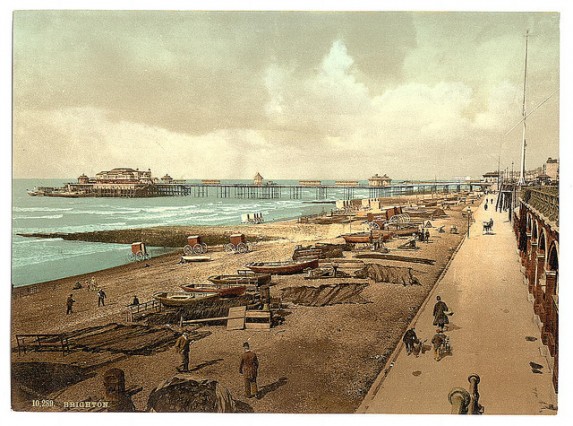
Anyway, we rejoin our heroes in the middle of a conversation about piers. Because The Monitors is the place to go for all your pier-related news.
What’s your favourite pier in Britain?
Well, actually here in Brighton was, for a while.The broken one, that’s the one I visited as a kid and, well, I believe it was still there. It must have been, right? I was there in ’93. I was young, but it was awesome.
I never got to go. I never got to see it. I came here just after the fire…
Yeah, it had the perfect amount of otherness. And yet, this is this collected idea of what a pier should be. This is like pleasure in the most Pinocchio sense, here’s all this sweetness and here’s all this fun and bright lights, and as a kid it was absolutely like a missile to the heart of my delight. I don’t want Mickey Mouse. I mean, I grew up in the land of Mickey Mouse and that was too structured, too safe. A pier is a dangerous place full of metal and, you know, jagged edges, and carnies.
We have a quite famous pier in LA, in Santa Monica where I grew up, Santa Monica pier, it’s quite a visually stunning place, I literally grew up there, so I have piers in my blood as well. More than America in my blood, trust me.
Cool. I’m glad we got some pier chat.
I mean, this is for a pier publication, right? Pier to Pier? We’re totally adrift, bringing the conversation back…
I mean… we can talk more about liminal spaces on the sea if you like…
I think it has as much to do with the whole act of being here. Touring and travelling is an act of communication. Just like fashion is this glacially moving language, I think travel is the same. You get these impressions, and I swear being in the UK has it’s own warp and weft. It communicates something. In general my music is informed by the travel and the things that impact it, like craters and stuff. I’m not saying this record is like that, this record was made actually during a long period at home, but it was yearning to be free, and yearning to be away from being stuck in the middle of sickness and death. And now, being here, it’s nice, and there’s a living being made and all this stuff, but it’s a different feeling when you’re leaving people at home.
Because you’re kind of tied to whatever material you’re promoting to some extent…
No, but I’m not! My whole existence, live, has been this thing of stupidly playing whatever I want, and people getting angry at me for it, generally. There’s this kind of thing that happens where bands are expected to do recitations of their music, right? They try to get as close to the CD sound as possible, just to give people the feeling they had at home with the song, and the song is the king, right? Well electronic music, at its best, is when you take people to an unknown place; and you enter it together, in this conversation, as a DJ or as whatever it is, to colour their vision and to push it forward to an unknown place that is thrilling and exciting and dangerous. The DJ space is a very hallowed one in this way, but we’re now in a phase of electronic music where people want the song, and it’s possible to do an exact reproduction of things, and maybe just a little remix or mashup that pushes the buttons of familiarity to a subtly unknown place.
But I’m much more one for the unknown completely. I’m happy to share the information of what I’m playing to people, but I like to mulch things up so much with the machinery that I use, so that I can avoid the pitfall of the prescribed space. Or if I’m feeling it that night, I’ll play an ambient set. I don’t want to give the finger to people, I don’t want to fuck around with people at a club night, but at the same time I love that I can do that. But people get angry when I do that. But that’s ok. It’s ok.
For me, I want to go and see someone having a lot of fun and trying to express something, and I don’t really care what that is as long as they’re trying to do it. And they’re more likely to be able to do that, with passion and verve, if they’ve got that freedom. It’s the same if I’m DJing – I just get really frustrated if I get people coming up to me, asking me to play records I don’t even own.
The worst thing is when they’re asking for the thing, like “Can you play something I can dance to?”, and it’s like, “Well, 20 other people are dancing to this”. I don’t know…
…I can’t help you with your dance problem…
But at the same time, it’s like people have expectations, and they come into the space with expectations, and over time we’re reinforcing this notion that a club isn’t somewhere you go and have an unknown experience, a club is where you go and have the exact experience that you’ve seen on TV so many times. It’s dangerous, it’s very dangerous. That’s why I think festivals are so popular, because it’s a bit more of an open space. You will discover new bands, supposedly, even though you are trying to only see bands you know about. There’s less prescription. Leave doctors to prescribe shit, we don’t need to. Anyways. I’m hoping for fun tonight that way.
Jumping back a tiny bit… not all of the way back… it’s interesting that you say that electronic music allows you to be better and more exciting live, because there’s a perception sometimes that people who play electronic music live are probably just pressing play on a laptop and not doing anything, and you can’t engage with them on stage. I disagree, as a rule, but how does that feel for you? Are you conscious of trying to make it feel interesting for the people who are watching, as opposed to just the people who are listening?
I think it’s a sensory experience. Even though I find music to be the ultimate expresser, we’re visual creatures, we’re auditory people, and there are smells going on too, and if you’re really talking about the smells in a club it’s usually pretty shitty, so we might as well do better for the visual and the audio if the rest of it’s going to be so diminished. And touch. Sweaty bodies are not always the best thing in the world, so try to highlight the good in things.
I am conscious that people are watching, and I’m not trying to be overly contained. I will try to be myself as much as possible despite being watched, but I do make the effort to turn my equipment forwards so people can see the action and understand a little bit of what’s going on musically, because I do think it’s very important to invite people into the conversation. I feel like I get a lot back from a moving or engaged audience, much more than a dead, limp fish.
I bring up a story of a photo of various friends really enjoying a noise gig, in which we all look like we’re in a state of abject misery.
It’s a visceral and mental thing, it’s a strange combo. It’s like those weird cuisines, where you have pineapple on pizza. It’s a weird one, noise concerts. Pineapple on pizza. I had a night last night that was just like that, there were a few people that wanted to dance and they did it, but a lot of the people were a little… it just wasn’t the right night for it. It was a Tuesday night, it was an early show.
It just wasn’t the night, and I loved it, because I play a lot of dance nights where people are just waiting for the dance, and waiting waiting waiting until you give it to them, and they’re just like looking at you like, “what the fuck are you doing?”. Not to cuss about it too much, but yeah, they’re waiting. But last night they didn’t, and we were able to go to a very emotional place, as a night, and it seemed like people had an authentic experience. I had an authentic experience because of it. Not saying I want that all the time, the dance is nice, it’s a more direct communication than a staring face.
So would you describe yourself as an improvisational musician?
Yes.
You are literally making it up as you go, it’s not like you have a kind of… Well, obviously you’re basing what you play on structures…
Yeah, I’m trying to reproduce; sometimes my songs, sometimes other people’s songs. I’m trying to be respectful to BPMs and to circumvent. If you’re just playing free, you’re not going to have people dance because dancing necessitates regularity, so there’s a few things that I have given up in terms of control, to have a certain amount of expectation. Any improviser, you set up expectation and then you defeat expectation. I think that’s part of music in general, or the kind of communication of art, there has to be some sort of display of artistry, but with the temperament of content.
That being the case I have ideas of what I want to present for the night, but I have all the freedom in the world because of my equipment, and hopefully my experience, to go somewhere else if need be (or if want be). So that makes me feel like I’m an improviser, even though I have these structures that are, like, ‘this song communicates with this song, communicates with this song’. And harmonically that’s a big consideration, because things can easily get harmonically dissonant really badly, and I’m trying to be respectful to the fact that what is absolutely like nails on a chalkboard doesn’t necessarily make people happy, so I’m trying to balance a bunch of those considerations.
So you were talking about the press play culture that exists in electronic music? I feel like I have to defend myself a lot versus that, because people see equipment and literally they tune out so quickly, they’re so out of the conversation because they assume that you’re doing nothing, and so I sometimes feel like I have to do it way bigger, I have to let people know a lot more, with the sound and with the equipment. But the truth of the matter is that I think a more educated audience is a better audience, and we have given people such a low IQ.
I mean, the majority of electronic artists have just assumed the worst and had a flash, in terms of lighting and just big sounds, and it’s brostep or whatever you want to call it, it’s like the lowest common denominator runs so much. Whereas if I’m only playing to the 1% of 1% anyway, I might as well have maximum fun anyway. 1% of 1% of 1% of 1%. That’s my audience and I’m happy with that. That’s still like 10 people and that’s awesome. It’s alright. As long as those ten people come to every show, it’s good.
And I’m so happy that this revolution has happened where more people have tools to make music, because they realise how frustrating and hard and difficult it can be. And then they understand exactly what goes into it, and then that makes it more special. I feel like there’s something that we’ve lost in terms of education, you know, we have no more music in schools, and art education is basic. It used to be that people understood how to paint, and how to make music well, or at least what it took to make the thing go. We’ll get back there, I think.
I do quite like when I’m watching electronic artists, trying to figure out what bit of kit is doing what. I really love electronic music and I really love watching it live, because there are so many different levels that you can get out of it.
I agree, but I think a lot of times the equipment is not made for performance, it’s made for production, and that’s a shame. There’s a reason why most instruments are forward facing acoustic resonators. Not just for the volume aspect, because the piano’s resonator faces out, but the keys are structured in such a way that you can see the hands on keys, it’s not totally hidden. Something is very important about why these instruments have evolved this way, and electronic music has just for some reason ignored it.
Apart from the odd keytar.
The keytar is a fidgety instrument, let’s not put too much air into that thing, because it’s making a bit of a comeback. Which is fine, I love Dam-Funk, he’s from LA as well, it’s great. I will leave it at that.
But I mean, I do think we’re missing an opportunity to present more performance in this mix. But it’s already happening, there are more instruments coming out. I mean, tonight we’re using the instruments forwards, it’s great.
We should probably start heading towards the venue because I actually play at 9.30pm tonight, which is a wonderfully early set. I think tomorrow night is also kind of early as well, but the next night I go on at 3am…
[Emma]: Oh my goodness.
But that’s typical. That’s like Europe, that’s like a Friday night, you should be on at 3am!
[Emma]: I’m terrible, I just can’t… I don’t drink at all, so it gets to midnight and I’m starting to feel a bit sad…
Well you just get the Cinderella thing, that’s OK! Sometimes we all have to change into our respective anamorphic forms. I feel like sometimes I turn into a cat, that’s okay.
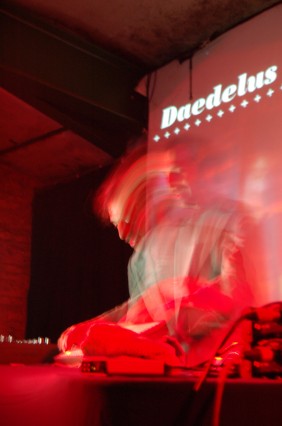
At which point Alfred Darlington promptly turns into a cat, brushes affectionately past a barista and disappears up the road towards the Green Door Store, where he’s next spotted orchestrating an indescribable torrent of noises…[which we nevertheless managed to describe here]…
Words: Alex Allsworth
Photos: Emma Charleston
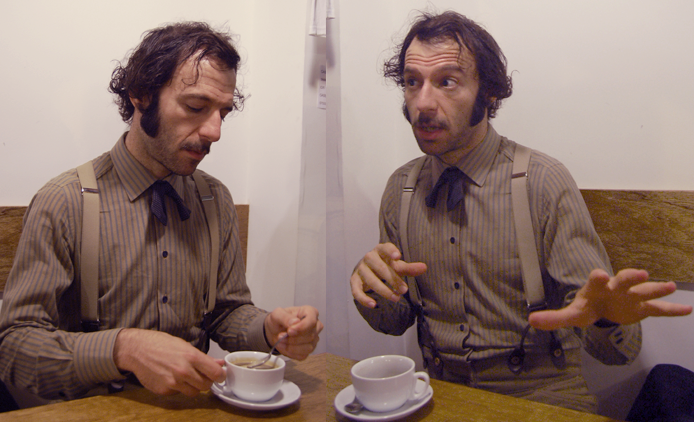
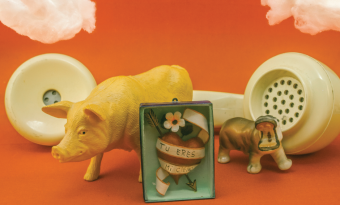

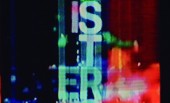


Follow us
Follow us on Facebook Follow us on Twitter Follow us on Google+ Subscribe our newsletter Add us to your feeds